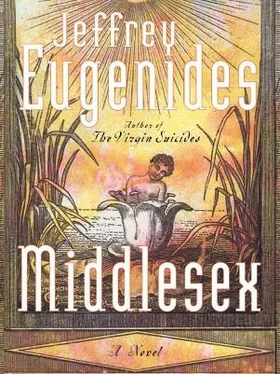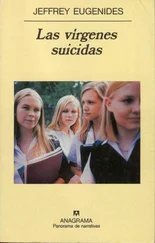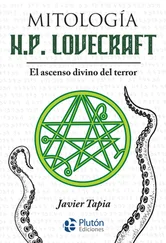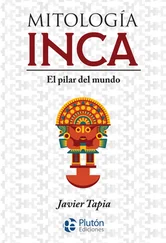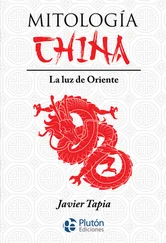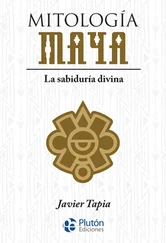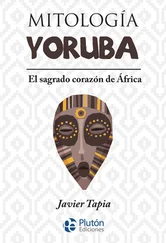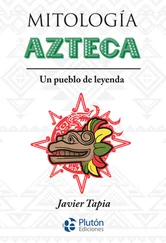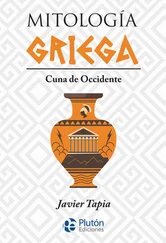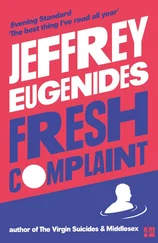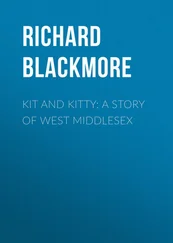Our room had been carved out of a once-bigger suite. Now the angles of the walls were skewed. Even Tessie, pint-sized, felt constricted. For some reason the bathroom was nearly as large as the bedroom. The toilet stood stranded on loose tiles and ran continuously. The tub had a skid mark where the water drained out.
There was a queen-size bed for my parents and, in the corner, a cot set up for me. I hauled my suitcase up onto it. My suitcase was a bone of contention between Tessie and me. She had picked it out for me before our trip to Turkey. It had a floral pattern of turquoise and green blossoms which I found hideous. Since going off to private school—and hanging around the Object—my tastes had been changing, becoming refined, I thought. Poor Tessie no longer knew what to buy me. Anything she chose was greeted by wails of horror. I was adamantly opposed to anything synthetic or with visible stitching. My parents found my new urge for purity amusing. Often my father would rub my shirt between his thumb and fingers and ask, “Is this preppy?”
With the suitcase Tessie had had no time to consult me, and so there it was, bearing a design like a place mat’s. Unzipping the suitcase and flipping it open, I felt better. Inside were all the clothes I’d chosen myself: the crew neck sweaters in primary colors, the Lacoste shirts, the wide-wale corduroys. My coat was from Papagallo, lime green with horn-shaped buttons made from bone.
“Do we have to unpack or can we leave everything in our suitcases?” I asked.
“We better unpack and put our suitcases in the closet,” Milton answered. “Give us a little more room in here.”
I put my sweaters neatly in the dresser drawers, my socks and underpants, too, and hung my pants up. I took my toiletry case into the bathroom and put it on the shelf. I had brought lip gloss and perfume with me. I wasn’t certain that they were obsolete.
I closed the bathroom door, locked it, and bent close to the mirror to examine my face. Two dark hairs, still short, were visible above my upper lip. I got tweezers out of my case and plucked them. This made my eyes water. My clothes felt tight. The sleeves of my sweater were too short. I combed my hair and, optimistically, desperately, smiled at myself.
I knew that my situation, whatever it was, was a crisis of some kind. I could tell that from my parents’ false, cheery behavior and from our speedy exit from home. Still, no one had said a word to me yet. Milton and Tessie were treating me exactly as they always had—as their daughter, in other words. They acted as though my problem was medical and therefore fixable. So I began to hope so, too. Like a person with a terminal illness, I was eager to ignore the immediate symptoms, hoping for a last-minute cure. I veered back and forth between hope and its opposite, a growing certainty that something terrible was wrong with me. But nothing made me more desperate than looking in the mirror.
I opened the door and stepped back into the room. “I hate this hotel,” I said. “It’s gross.”
“It’s not too nice,” Tessie agreed.
“It used to be nicer,” said Milton. “I don’t understand what happened.”
“The carpet smells.”
“Let’s open a window.”
“Maybe we won’t have to be here that long,” Tessie said, hopefully, wearily.
In the evening we ventured outside, looking for something to eat, and then returned to the room to watch TV. Later, after we switched off the lights, I asked from my cot, “What are we doing tomorrow?”
“We have to go the doctor’s in the morning,” said Tessie.
“After that we have to see about some Broadway tickets,” said Milton. “What do you want to see, Cal?”
“I don’t care,” I said gloomily.
“I think we should see a musical,” said Tessie.
“I saw Ethel Merman in Mame once,” Milton recalled. “She came down this big, long staircase, singing. When she finished, the place went wild. She stopped the show. So she just went right back up the staircase and sang the song over again.”
“Would you like to see a musical, Callie?”
“Whatever.”
“Damnedest thing I ever saw,” said Milton. “That Ethel Merman can really belt it out.”
No one spoke after that. We lay in the dark, in our strange beds, until we fell asleep.
The next morning after breakfast we set off to see the specialist. My parents tried to seem excited as we left the hotel, pointing out sights from the taxi window. Milton exuded the boisterousness he reserved for all difficult situations. “This is some place,” he said as we drove up to New York Hospital. “River view! I might just check myself in.”
Like any teenager, I was largely oblivious to the clumsy figure I cut. My stork movements, my flapping arms, my long legs kicking out my undersized feet in their fawn-colored Wallabees—all that machinery clanked beneath the observation tower of my head, and I was too close to see it. My parents did. It pained them to watch me advance across the sidewalk toward the hospital entrance. It was terrifying to see your child in the grip of unknown forces. For a year now they had been denying how I was changing, putting it down to the awkward age. “She’ll grow out of it,” Milton was always telling my mother. But now they were seized with a fear that I was growing out of control.
We found the elevator and rode up to the fourth floor, then followed the arrows to something called the Psychohormonal Unit. Milton had the office number written out on a card. Finally we found the right room. The gray door was unmarked except for an extremely small, unobtrusive sign halfway down that read:
Sexual Disorders and Gender Identity Clinic
If my parents saw the sign, they pretended not to. Milton lowered his head, bull-like, and pushed the door open.
The receptionist welcomed us and told us to have a seat. The waiting room was unexceptional. Chairs lined the walls, divided evenly by magazine tables, and there was the usual rubber tree expiring in the corner. The carpeting was institutional, with a hectic, stain-camouflaging pattern. There was even a reassuringly medicinal smell in the air. After my mother filled out the insurance forms, we were shown into the doctor’s office. This, too, inspired confidence. An Eames chair stood behind the desk. By the window was a Le Corbusier chaise, made of chrome and cowhide. The bookshelves were filled with medical books and journals and the walls tastefully hung with art. Big-city sophistication attuned to a European sensibility. The surround of a triumphant psychoanalytic world-view. Not to mention the East River view out the windows. We were a long way from Dr. Phil’s office with its amateur oils and Medicaid cases.
It was two or three minutes before we noticed anything out of the ordinary. At first the curios and etchings had blended in with the scholarly clutter of the office. But as we sat waiting for the doctor, we became aware of a silent commotion all around us. It was like staring at the ground and realizing, suddenly, that it is swarming with ants. The restful doctor’s office was churning with activity. The paperweight on his desk, for instance, was not a simple, inert rock but a tiny priapus carved from stone. The miniatures on the walls revealed their subject matter under closer observation. Beneath yellow silk tents, on paisley pillows, Mughal princes acrobatically copulated with multiple partners, keeping their turbans in place. Tessie blushed, looking; while Milton squinted; and I hid inside my hair as usual. We tried to look someplace else and so looked at the bookshelves. But here it wasn’t safe either. Amid a dulling surround of issues of JAMA and The New England Journal of Medicine were some eye-popping titles. One, with entwining snakes on the spine, was called Erotosexual Pair Bonding. There was a purple, pamphlety thing entitled Ritualized Homosexuality: Three Field Studies. On the desk itself, with a bookmark in it, was a manual called Hap-Penis: Surgical Techniques in Female-to-Male Sex Reassignment. If the sign on the front door hadn’t already, Luce’s office made it clear just what kind of specialist my parents had brought me to see. (And, worse, to see me.) There were sculptures, too. Reproductions from the temple at Kujaraho occupied corners of the room along with huge jade plants. Against the waxy green foliage, melon-breasted Hindu women bent over double, offering up orifices like prayers to the well-endowed men who answered them. An overloaded switchboard, a dirty game of Twister everywhere you turned.
Читать дальше
Конец ознакомительного отрывка
Купить книгу
